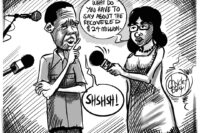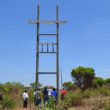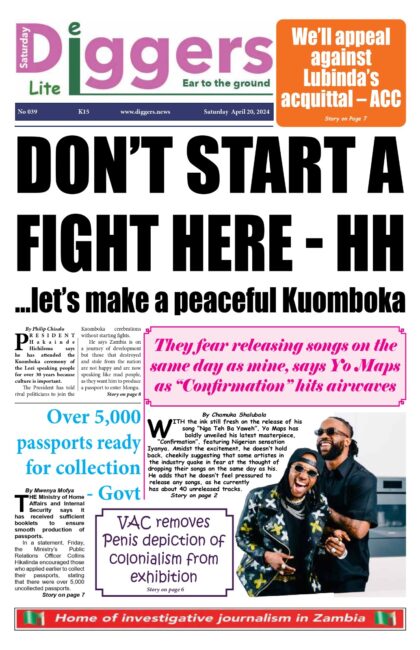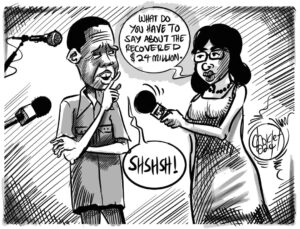Finance Minister Felix Mutati says no one pushed government to increase electricity tariffs.
And Mutati says government has gained traction with the IMF and a locally-driven aid package will be signed soon.
At a media and civil society briefing on the International Monetary Fund (IMF) engagement today, Mutati said increasing electricity tariffs was inevitable.
“You recall that we already removed subsidies, fuel we are already at market rates, electricity, we are almost there, we have had a 75 per cent increase, we have engaged a consultant who is undertaking a study for cost reflective tariffs and I think the tariffs must be understood within a proper context. There is no way you can deliver a service that you are unable, as a company, to cushion. Zesco was in a situation where they were delivering power at a cost above revenue and that is not sustainable. No matter how kind you are, you cannot give what you don’t have so the tariffs must be understood in that perspective,” Mutati said.
“The point I am making is that these are decisions that were driven and made by government and nobody was pushing us from behind. We are hoping that the other reforms such as the legal reforms, enacting the legal finance act, the budget act, the loans and guarantees act, ZPPA act, will come to pass at the next sitting of Parliament. These are critical for fiscal consolidation. They are critical for minimizing misapplication of public resources.”
And Mutati said government had gained traction with the IMF.
“The IMF engagement was constructive, tough, but we said we can only be able to implement and deliver something that we own, something that we will remain accountable to. So the role of IMF becomes one of monitoring the things that we have agreed upon, the benchmarks. Whether those benchmarks relate to levels of debt, whether those relate to macroeconomic objectives, or to social protection, that is the role that they are going to play. Whether those benchmarks are going to relate to either FISP of e-voucher, the decision is basically ours,” said Mutati.
“So there is nothing that is external that is IMF like, this is our programme so even the cooperating partners that we were engaging yesterday, we explained to them, support the Zambia Plus programme. And the support that we are looking for is at two levels, one, that the commitment that they made for the Zambia Plus 2016 is delivered, two, we are looking for budget support particularly from the multi-laterals such as the World Bank and the Africa Development Bank. And we believe we are going to be very successful without any shade of doubt. So we have gained traction with IMF, we have no doubt in our minds that we are going to conclude the programme.”
Mutati thanked civil society organizations for constantly giving counsel to government.
Meanwhile, Finance Permanent Secretary-Economic management and Finance Mukuli Chikuba said an IMF team would be in Zambia at the end of May to touch up on some of the reforms that were remaining.
“The IMF will come back at the end of May to touch up on some of the reforms that were remaining and one of them is implementation of the subsidy programmes in the agricultural sector, the subsidy programmes in electricity and in fuel, how we are going to manage it more efficiently, going back to the private sector procuring fuel. So that is a short mission, it will be a one week mission. And at the beginning of the third quarter, we do expect that we will have a board of the fund sitting to approve Zambia’s programme with the fund. We will also agree the level of support in terms of the external sector when they come in May so that is how we are moving with the IMF and we are right on track,” said Chikuba.
He also admitted that high lending rates in Zambia were an impediment to economic growth.
“We do agree with you that lending rates are an impediment to economic growth, we do agree with you that the private sector needs to borrow at affordable rates for them to operate and I agree with you that around 29 percent, the rates are high but again, the history is there as to where we have ended up, we know what happened last year in the economy and the Bank of Zambia had to control money supply just to stabilize the currency and also bring down inflation. This time around, the currency is highly stable and inflation has come down to single digit and the first step towards that recognition, Bank of Zambia took measures to loosen the instruments that they use to control money supply and by so doing, they started releasing money back into the economy,” said Chikuba.
“Bank of Zambia is working to ensure that the interest rates come down and we are also doing our part. It will take a bit of time, but surely, they have started coming down and we are hopeful that by the end of the year, we will be sitting around comfortable levels without the shocks that we had in the economy.”













2 Responses
There’s nothing historical about high interest rates. MMD did a great job of controlling inflation to single digits. Businesses were borrowing at 18% in 2011 when PF took over power. But the PF govt crowded out the private sector by excessive borrowing. That’s why companies are now borrowing at over 50%. Who is to blame? Whatever the IMF will be fine tuning means those are conditionalities. You can name them whatever you want but IMF will not give money to be stolen by PF.
This is exactly what we were told by our own unpatriotic Zambian leaders like this Mutati during the 197os-80s, when the western sanctioned structural adjustment programs were forced on African people/governments by this same IMF, and you recal what happened then, total poverty…
Now, Mr. Minister please don’t kid us…IMF will never/ does not give out loans without telling you what to do. please learn to tell the truth for once, What is wrong with you MMD people sure?? Its like telling your neighbour ati my wife’s family did’t tell me how much lobola I should pay but I paid anyway…
Total stupidity!!